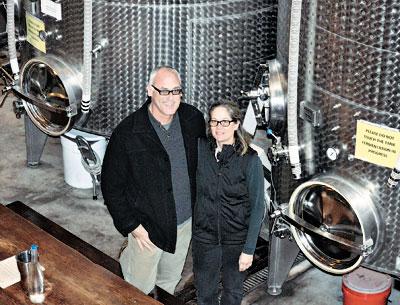Food and Wine, All Homegrown

Sustainable winemaking paired with seasonal food is a way of life for David Page and Barbara Shinn, one that “keeps the community of food and wine intact,” said Mr. Page on Sunday afternoon. Whether it’s breakfast at their Farmhouse Inn, or an organic wine dinner offered about 10 times a year at their Shinn Estate Vineyards, the couple is committed to offering the best of the best when it comes to wine and foodstuffs, grown in their garden or greenhouse or procured from someone they know.
Shinn Estates’ premier wines, produced on Oregon Road in Mattituck exclusively with solar and wind power, have been acclaimed both locally and by national publications. One of just three wineries in the country to be “third-party certified” (by professional inspectors) for sustainable practices, the vineyard is also one of only two that lists all its ingredients. There are some 30 commonly used ingredients in wine that are not disclosed, Ms. Shinn explained, including preservatives, color extracts, sugar, glycerin, wood chips, nitrates, and even monosodium glutamate (MSG). “Just like a bag of Doritos,” she said.
Doing “everything possible to shorten the list of ingredients” is part of their mission, said Mr. Page. Successful recent batches contained exactly one ingredient — grapes.
Soil nutrition is key in reducing additives, Ms. Shinn said. Long Island Sound seawater is used for its trace minerals, as well as compost.
Wines offered for tasting, purchase, and on the menu in many restaurants include Malbec, merlot, Cabernet Sauvignon or Franc, Sauvignon or Pinot blanc, rosé, chardonnay, and a sparkling brut, as well as brandy and grappa.
After meeting in California, the chef and viticulturist created Home, a restaurant in Greenwich Village, pairing New York State wines with local culinary treasures. The couple operated the restaurant for 15 years and it is still in existence. The farm-to-table restaurant has since given birth to “Recipes from Home,” an award-winning cookbook, as well as the Drovers Tap Room and Home Away from Home, a take-out shop.
Seeking to reconnect with nature, the couple purchased a 20-acre historic North Fork estate, sold the development rights to the town of Southold, planted vines, and became just the second family to inhabit it since the Tuthills, its original owners in the 1880s. Joining them on the farm is “a dog, a cat, and a bunch of chickens,” not counting the many who visit their Farmhouse Inn annually to enjoy sunset over the vineyard, walk or ride to a nearby beach, or explore the neighboring communities.
With “no lack of culinary creativity,” Mr. Page said he and Ms. Shinn serve inn guests a breakfast with eggs from their own chickens, home-cured local bacon, and cheese courtesy of a local cow. Wine dinners might include smoked duck leg, leafy greens, potatoes, and carrots from their garden.
Weekly tours of the vineyard and winery led by Ms. Shinn are popular year round with visitors, who learn about her progressive farming techniques. A popular lecturer on the subject as well, she has spoken at such institutions as the American Museum of Natural History and the Smithsonian.
The vineyard tour features the custom-designed solar panels and wind turbine, “perfectly implemented,” said Mr. Page, to supply the 50,000 kilowatts of power required yearly. With rebates, tax incentives, and a federal grant, the sustainable power is expected to save $10,000 per year over its 25-year expectancy and pay for itself in five years.
“Just like the English settlers who started farming on Long Island in 1640 and the Native Americans 10,000 years before that,” Ms. Shinn has a mission to sustain agricultural use of the land for many more generations, working with 14 other vineyards as part of the Long Island Sustainable Winegrowers. The group guides others in returning to traditional conservation methods that avoid soil erosion, runoff, and the overuse of nitrogen fertilizers known to have a negative effect on Long Island’s bodies of water. Techniques include biological control of insects as an alternative to chemicals, which, Ms. Shinn remarked, “kill everything.”
It’s “almost impossible” to get a room at the Farmhouse Inn in the summer, said Mr. Page, theirs being the only place to stay within a vineyard. Weekends are often booked year-round as well. Whether from New York City, New England, California, or Japan, guests seek peace and quiet away from the highway and just a mile from the beach. The couple has traveled extensively, but, said Mr. Page, there is “nothing like this.”
As cold weather sets in, guests may choose to read or enjoy wine and cheese in a cozy sitting room heated by a wood-burning stove, while day visitors fill a warm, wood-filled candlelit tasting room within the expanded 125-year-old barn.
The next wine dinner will take place on Dec. 15, when a maximum of 34 guests will be served from a wood-burning oven in a venerable dining room. Mr. Page said the menu will likely include Long Island duck from Crescent Farms, local fish from the Southold Fish Market, vegetables from the couple’s greenhouse or their winter share at Sang Lee Farms, and maybe even persimmon pudding. A friend has a tree.
